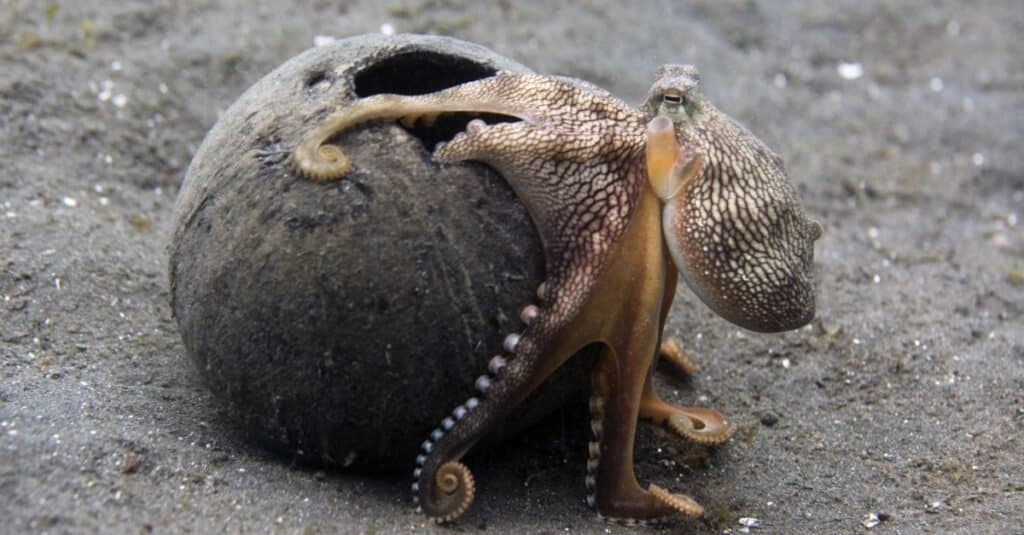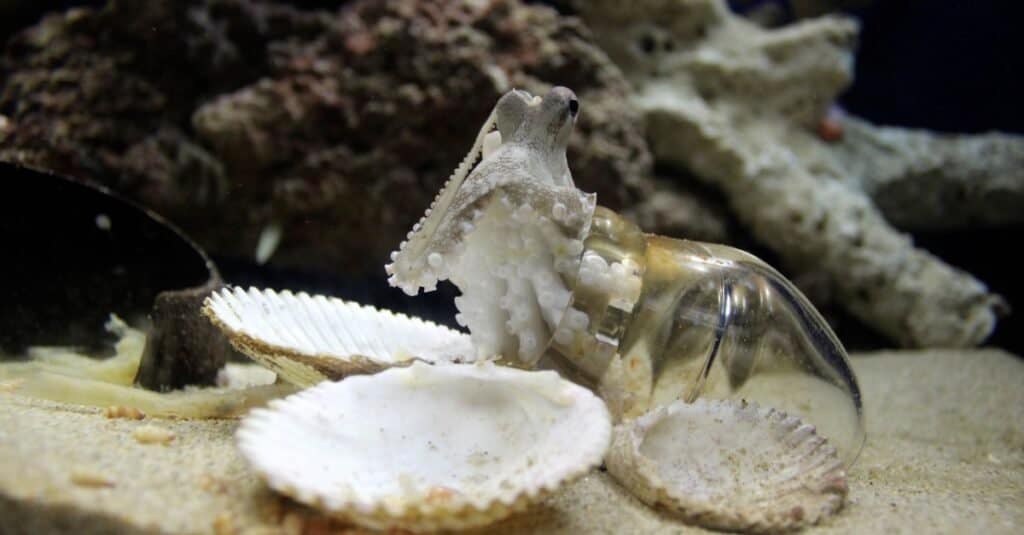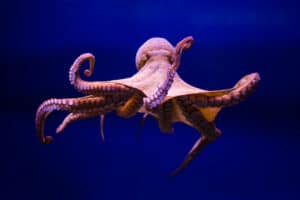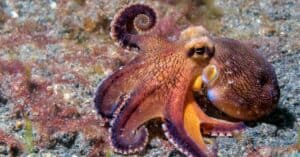In many ways, octopuses are the closest thing to having aliens on earth. These intriguing cephalopods are incredibly unique, boasting three hearts pumping blue blood. Perhaps more noteworthy, however, is the fact that these sea creatures have more than one brain. In addition to a central brain located between the eyes, octopuses have separate “mini-brains” at the base of each of their eight tentacles. Unlike most creatures, octopuses have nine brains, and they put them to incredibly adept use.
Given all the brainpower they ostensibly have, shouldn’t octopuses rule the world? Not quite. Although they have a central brain and eight separate ganglia, or mini-brains, their nervous systems are wired entirely differently from most vertebrates, including mammals like humans. Still, compared with most invertebrates, octopuses are remarkably intelligent. These intriguing oceanic creatures have versions of short- and long-term memory, for example. They are even capable of recognizing individual people by sight.

©Agarianna76/Shutterstock.com
Nine Brains: The Anatomy of an Octopus’s Nervous System
Octopuses possess a central brain. Situated between their eyes, this brain has a distinct doughnut-like shape, forming a ring around the creature’s esophagus. Technically, when an octopus ingests food, it passes through the “center” of this central brain. This is just one of many facts highlighting how different the anatomy of an octopus’s nervous system is compared to vertebrates and many other invertebrates.
Neurons are like messengers that send signals and information from the brain to various parts of a creature’s body. Across its entire body, the typical octopus – scientific name Octopus vulgaris – possesses approximately 500 million neurons. That may sound like a lot, but humans have upwards of 100 billion. However, octopuses have roughly the same number of neurons as dogs, known for their ability to learn various commands. Therefore, it’s not much of a stretch to say that octopuses are keenly intelligent – especially for invertebrates.
Approximately 180 million of the 500 million neurons found in an octopus are concentrated in the central brain. Roughly 40 million or so additional neurons are located in each of the ganglia of each of its eight arms, or tentacles. Therefore, 320 million of an octopus’s neurons – more than two-thirds of them – are found at the bases of its arms rather than in its central brain. Incredibly, a single octopus arm possesses more neurons than you will find in a frog’s entire body – just one of many intriguing facts about their nervous systems.
Because each arm has its own ganglia, or cluster of neurons, each arm can act independently of an octopus’s central brain and other arms. The neurons at the base of each arm connect to suckers spread across it; typically, each arm has roughly 250 suckers. Each sucker may have around 10,000 neurons, which it uses to detect physical sensations via touch. These neurons also sense chemicals, allowing each arm to smell and taste objects while exploring them.
Octopuses lack proprioception. This means that they don’t have a fixed “map” in their minds allowing them to know what various parts of their bodies are doing. While a human can target a spot on their back without physically seeing it, octopuses lack this perception entirely. There’s a good reason for this: Unlike humans, octopuses don’t maintain a static body shape. Instead, their bodies are remarkably fluid, constantly changing to adapt to the environment. Octopuses make up for their lack of proprioception by having those separate “mini-brains” at the base of each of their eight arms.
Benefits of Having Multiple Brains
If having multiple brains doesn’t make octopuses the most intelligent creatures on earth, what’s the point? As noted above, having distinct ganglia controlling each tentacle makes up for the creature’s fluid body and lack of proprioception. These mini-brains lift some of the burden from the central brain, allowing it to perform more complex tasks.
Some of the top benefits of the octopus’s central brain and eight ganglia makeup include:
- They can react faster to threats because individual ganglia don’t have to communicate with the central brain.
- They can fine-tune the movement of each arm, passing the work off to the ganglia.
- They can regenerate new arms if one is severed – and the new arm even generates a new ganglion.
Octopuses’ Brains and Nervous Systems vs. Vertebrates’ Brains and Nervous Systems
Octopus brains share no common anatomy with invertebrates’ brains. Later, we’ll delve into how evolution played a vital role in this phenomenon. For now, it’s important to note that although the anatomies are strikingly different, octopuses still have particular cognitive abilities in common with vertebrates like humans. For instance, they are believed to possess forms of long- and short-term memory, and they engage in a form of sleep. Octopuses are known to explore objects through play, and they can recognize and distinguish between individual people.
When considering the relative size of an octopus’s brain to its body, it’s easier to see why they are among the most intelligent invertebrates. The relative size of octopuses’ brains is within range of that of vertebrates. It’s not quite as high as the relative size of mammals’ brains to their bodies, but it’s still significant and sets them apart from the vast majority of invertebrates.
Thanks to the design of an octopus’s nervous system and the relative size of its brain – or brains, as it were – these cephalopods are famous for displaying keen intelligence in many ways. Examples of things that octopuses are smart enough to do include:
- use visual cues to discriminate between two familiar environments, selecting the best route toward a reward
- navigate simple mazes
- unscrew a jar to get food inside it – or to escape a jar by unscrewing it to reach food
- untie knots
- complete simple puzzles
- find their way out of enclosed areas
Why Are Octopuses’ Nervous Systems So Different from Humans’?
To understand why octopuses are so different from humans – especially why they have nine brains versus one – it helps to consider their evolutionary past. The last common ancestor of vertebrates and mollusks like octopuses existed more than 600 million years ago, making it more than twice as ancient as the first dinosaurs.
The evolution of vertebrates and mollusks split off and proceeded independently of each other millennia ago. Vertebrates, including mammals, fish, birds and reptiles, developed nervous systems with a chordate design. This means that a cord of nerves runs down the middle of their backs, and a brain is at one end.
On the other hand, invertebrates’ neurons are typically clustered into several ganglia, tiny knots arranged around the body and connected to one another. As cephalopods like octopuses evolved, some of their ganglia became more complex; new ones were often added. Some neurons started becoming concentrated at the front of the creature, becoming more and more like a centralized brain.

©RMcCurdy/Shutterstock.com
Facts About How Octopuses’ Brains Communicate with Each Other
Although octopuses have nine separate brains, they are still connected to and communicate with each other. The eight ganglia, or mini-brains, have their own neural ring that bypasses the central brain. As a result, an octopus’s arms can transmit information to each other without involving the central brain, allowing them to coordinate more effectively.
More research needs to be done, but scientists suspect that the setup of an octopus’s nervous system gives them localized and top-down control – something that is important for a creature with a changing body shape and partially decentralized nervous system. The central brain may be used to control an arm’s path through eyesight while the individual ganglion at the base of each arm fine-tunes movement, allowing it more precision. This also allows each arm to taste, smell and feel objects along the way independently.
Embodied Cognition
Researchers suspect that humans may use a form of embodied cognition, meaning that their bodies – not their brains – are responsible for some of their “smartness.” In octopuses, embodied cognition is a crucial part of how they make their way in the world. Their bodies are not separate things controlled by a central brain; instead, they have suffused nervous systems that are helped along by distinct ganglia.
The Relationship Between the Central Brain and Separate Ganglia
In an octopus, the central brain and its approximately 180 million neurons determine what the creature wants or needs; for example, it may send an alert to find food. This command, “find food,” is transmitted to the ganglia of all eight tentacles. In turn, each tentacle collects and processes its own positional and sensory information. From there, each tentacle issues its own commands about how to move most effectively, stiffening and relaxing specific areas for optimal efficiency. These ganglia continue collecting and processing sensory information as the arms move, sending the data to the central brain, which goes on to make more comprehensive decisions.
As crazy as it may seem, octopuses do indeed have nine brains. These separate brains play a significant role in octopuses’ unique intelligence and personalities, making them the most intelligent invertebrates on the planet.
Why Are Octopuses So Intelligent?
The evolution of octopuses might be the reason! Octopuses are a group of mollusks — like clams and oysters — yet they do not have a shell. According to researchers from the University of Cambridge, this is precisely how octopuses became so much smarter than other mollusks.
Their ancestors once had shells. By giving these up, octopuses could move their bodies around with more freedom, and reach into all sorts of small places to get food. With more food options available, they needed to become smarter in order to find it. Researchers believe that these challenges pushed octopuses to evolve to a higher level of intelligence.
However, without a shell, octopuses also became more vulnerable than their ancestors, which could also contribute to why octopuses are so smart. This vulnerability likely prompted them to evolve new tactics like their incredible color, texture-changing skin, and their creative use of tools. They also became much more flexible in their movements and in the way they think.
The photo featured at the top of this post is © iStock.com/aurigadesign
Thank you for reading! Have some feedback for us? Contact the AZ Animals editorial team.






